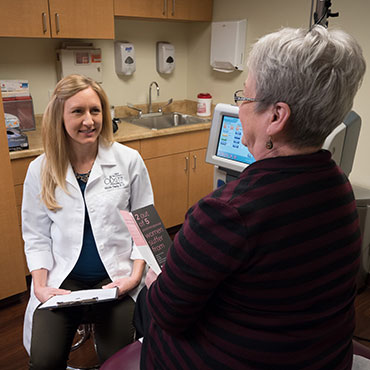General Questions

What are the different types of IUDs?
Skyla, Kyleena, Mirena, Liletta, and Paragard are the choices if you are considering an intrauterine device (IUD) for birth control. The IUD is over 99% effective in preventing pregnancy and can be left anywhere from 3-10 years, varying by the brand. A common side effect of a progesterone-containing IUD is lighter but more irregular bleeding for the first few months (Skyla, Kyleena, Mirena, and Liletta). A common side effect of the copper IUD (paragard) is increased bleeding.Skyla, Kyleena, Mirena, Liletta, and Paragard are the choices if you are considering an intrauterine device (IUD) for birth control. The IUD is over 99% effective in preventing pregnancy and can be left anywhere from 3-10 years, varying by the brand. A common side effect of a progesterone-containing IUD is lighter but more irregular bleeding for the first few months (Skyla, Kyleena, Mirena, and Liletta). A common side effect of the copper IUD (paragard) is increased bleeding.
How do I do a self-breast exam?
Even though less than 5% of breast cancer cases in women are under age 40, all women should regularly check their breasts. When checking your breasts, you should look for lumps, bumps, and changes. This is the best breast cancer detection that leads to the best outcomes. Your gynecologist can show you the right way to perform a self-exam, and what to look for. And self-exams are easy to work into your self-care routine, such as during your daily shower.
Is it normal to pee when I sneeze or laugh?
Bladder leaks are common in women who have given birth as well as in women without children. If you notice leaking when you laugh, sneeze or exercise, know it’s not uncommon, and it’s not something you have to live with. There are exercises, pelvic floor physical therapy that can help. In refractory cases, your OBGYN can perform surgery to implant a sling to help prevent leakage.
Should I be tested for a sexually transmitted infection/ disease?
When you’re sexually active, STIs are a real possibility. Many STIs are treatable. If you are under age 26 and sexually active then we recommend STI screening. If you have a new partner and there’s a chance you could have an STI, let your doctor know. They can recommend testing and treatment.
Why am I itchy down there?
Persistent vaginal itching is abnormal. You may have a vaginal infection such as yeast, bacterial vaginosis, or even an STI. Diagnosis is made with vaginal cultures, so it’s always best to call your gynecologist.
Is sex safe during my period?
If your partner is okay with getting physical during your period, you might be wondering if you should give the green light. For most people, there’s no medical reason you need to abstain.
Is it PMS or something more serious?
As hormones rise just before a period begins, it’s common to feel moody. What isn’t normal is being unable to function, feeling depressed and hopeless. Or feeling so irritable that you snap. These symptoms can signal premenstrual dysphoric disorder (PMDD), which is treatable.
Why don’t I want to have sex?
Libido can be affected by life stressors, strained relationships, depression, being postpartum, and medications. Physical and medical causes (such as hypothyroidism) can also impact your libido. Be sure to talk to your gynecologist about your sex drive, or lack thereof, so they can better understand and help.
Does that smell normal?
Every woman has a different scent or pheromone. If the odor becomes “fishy” or is complicated by itching then you should certainly see your gynecologist.
I am considering pregnancy. Is there anything I need to do to prepare?
Pregnancy health starts well before conception. It is important to be as healthy as possible prior to pregnancy. It starts with taking a daily prenatal vitamin. It is important to manage and optimize any chronic illness or diseases like hypertension or diabetes prior to pregnancy. It is important to stop smoking, cut back on alcohol, decrease caffeine intake, and maintain and healthy weight.
I’m on my period. Should I cancel my appointment?
If you’re embarrassed about menstrual bleeding, don’t be! We are accustomed to vaginal bleeding. While menstrual blood may affect your pap smear let us be the judge. We know many times you have waited months to get in, and we don’t want you to have to wait longer. However, if you are having a procedure and on your period it is always best to call and check with the nurse first.
I have a lot of vaginal discharge. Is daily discharge normal?
Discharge is normal. In fact, it changes throughout your monthly cycle. The discharge may become clear and stretchy during ovulation. The discharge will also increase in pregnancy due to changes in hormone levels.
Why is sex painful for me?
Sex could be painful for any number of reasons. These reasons could include muscle spasms, ovarian cysts, endometriosis, vaginal atrophy, and more. If persistent, it is something that definitely warrants an exam and a discussion with your gynecologist.
What’s a normal age to first see a gynecologist?
A female at any age may see a gynecologist for concern or complication. This may include pelvic pain, vaginal discharge, heavy or irregular periods, or a need for birth control. Pap smears are not recommended prior to the age of 21.
What is Endometriosis?
With endometriosis, the tissue that is similar to the lining of the uterus will be found outside the uterus, attached to other parts of your internal organs. These lesions can attach to the ovaries, fallopian tubes, bladder, and bowel, causing chronic inflammation and sometimes, scarring. The condition can begin as soon as periods begin or late in life. Menopause does not always resolve the symptoms, because the lesions still exist, even if your periods have stopped.
When it comes to symptoms, endometriosis has varying levels of severity. The symptoms often include painful periods, ovulation and intercourse, heavy bleeding, chronic pelvic pain, and fatigue. Because these symptoms are common among other conditions, endometriosis can be difficult to diagnose.
Menstrual pain that affects the ability to function is one of the main symptoms that bring women to their physician or OBGYN. Excessive pain is never normal, and if it is altering your lifestyle, you should make an appointment to find out the cause of the pain. Endometriosis pain can also occur with bowel movements or urination, especially when you’re having your period. If it has been difficult to get pregnant, that may also be a sign that you should seek treatment and try to determine if endometriosis is the cause.
Diagnosis for endometriosis will include a pelvic exam, ultrasound and MRI, and possibly laparoscopy to find the endometrial lesions. Tissue samples can be taken with laparoscopy to determine the nature of any lesions they find. Scar tissue and lesions can also be removed during this procedure.
The good news is that treatment for endometriosis can be effective in relieving you of the pain and other symptoms. Pain medications and hormonal contraceptives can reduce pain. If you would like to conceive, a different approach will likely be explored, and you may be referred to a fertility specialist. Sometimes, a complete hysterectomy is required to remove the uterus and ovaries.
What is Adenomyosis?
With adenomyosis, the endometrial tissue grows into the muscle tissue of the uterus instead of remaining as a lining of the uterus. The clumps of tissue continue the normal process of menstruation. They thicken and break down as usual, but because the tissue is in the muscle, it can enlarge the uterus and cause heavy, prolonged menstrual bleeding and sharp, painful cramps. Painful intercourse and chronic pelvic pain or tenderness may also accompany this condition.
Heavy periods can be debilitating, requiring you to take time off of work. However, they can also have the effect of causing anemia, an iron deficiency. Anemia can result in further fatigue, so it is a good idea to discuss heavy bleeding with your OBGYN to determine the best steps for discovering the cause, easing this symptom, and treating the anemia with iron supplements.
Unlike endometriosis, adenomyosis is most common in women in their 40s and 50s. It usually ceases after menopause. Having a baby and previous uterine surgery may be risk factors for adenomyosis.
Again, diagnosing adenomyosis can be challenging, because it can mimic the symptoms of fibroid tumors, uterine polyps, and endometriosis. A pelvic exam will be conducted in order to gauge tenderness and enlargement of the uterus. Ultrasound and MRI exams may also help diagnose adenomyosis or endometriosis.
Treatment for adenomyosis often concludes with a hysterectomy, but other less invasive treatments will be tried first. Anti-inflammatory medications and hormones may help provide relief from the symptoms.

